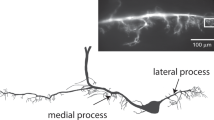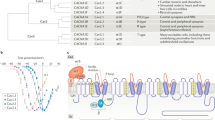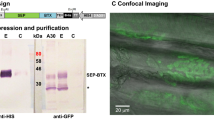Abstract
THE generally accepted mechanism of chemical transmission at excitatory and inhibitory synapses is an interaction of a transmitter substance with the sub-synaptic cell region, causing an increase of membrane conductance for specific ions. Excitatory transmission is essentially a depolarization due to the increased membrane permeability to one or more ions (predominantly Na+) which have their effective ‘electrochemical equilibrium’ potential near zero membrane potential. This system has been worked out most thoroughly in the vertebrate nerve–muscle junction by Katz, Fatt and Del Castillo1. An interesting variation of the above postsynaptic mechanism is described here.
This is a preview of subscription content, access via your institution
Access options
Subscribe to this journal
Receive 51 print issues and online access
$199.00 per year
only $3.90 per issue
Buy this article
- Purchase on Springer Link
- Instant access to full article PDF
Prices may be subject to local taxes which are calculated during checkout
Similar content being viewed by others
References
del Castillo, J., and Katz, B., Prog. Biophys., 6, 121 (1956).
Boistel, J., and Fatt, P., J. Physiol., 144, 176 (1958).
Author information
Authors and Affiliations
Rights and permissions
About this article
Cite this article
DUDEL, J., KUFFLER, S. Excitation at the Crayfish Neuromuscular Junction with Decreased Membrane Conductance. Nature 187, 246–247 (1960). https://doi.org/10.1038/187246a0
Issue Date:
DOI: https://doi.org/10.1038/187246a0
This article is cited by
-
Nonlinear voltage dependence of excitatory synaptic current in crayfish muscle
Pfl�gers Archiv European Journal of Physiology (1974)
-
Membrane Conductance during Depolarizing Postsynaptic Potentials of Crayfish Muscle Fibres
Nature (1962)
Comments
By submitting a comment you agree to abide by our Terms and Community Guidelines. If you find something abusive or that does not comply with our terms or guidelines please flag it as inappropriate.



